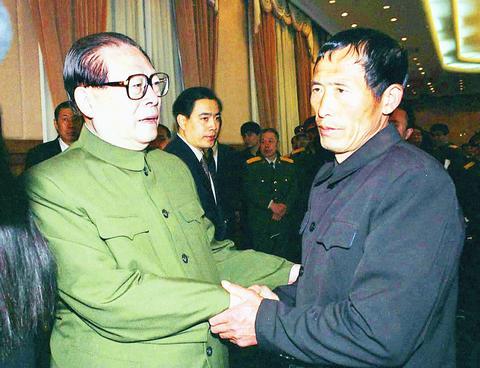In another arresting step toward official candor, the television news on Monday night showed the country's two top leaders comforting several relatives of the 70 men who died in a mysterious submarine accident.
Jiang Zemin (
The vessel had been towed to its home port near Dalian after the accident in the Yellow Sea.

PHOTO: REUTERS
Both in their meeting with relatives Monday morning and their visit to the ship -- said to have occurred two days ago -- the leaders wore unadorned green military uniforms, reflecting their positions at the head of the Central Military Commission.
The television cameras dwelt at length on each of the leaders, together and in turn, suggesting an intentional effort to defuse speculation that the two are jostling for advantage.
The catastrophe aboard Submarine 361 was first announced Friday night. That it was disclosed at all surprised many defense experts here and abroad because military accidents in the past have been kept secret. But when and how the crew members died, and how the vessel was so easily salvaged, have not been disclosed.
One naval officer who spoke with a foreign reporter said the accident occurred on April 16, when the ship's diesel engines failed to shut down during descent and sucked all the oxygen out of the cabins, suffocating the crew.
But that account has not been confirmed and official reports have blamed an unspecified mechanical failure for the disaster.
A television news broadcast and a report by the New China News agency Monday night said that Jiang and Hu met several relatives of the lost sailors in Dalian. Several other military leaders and local political chiefs were also present.
In the television report, Jiang and Hu both looked somber and genuinely moved as they shook hands and traded words with several grieving family members.
Jiang was reported as saying, "After I learned of the terrible loss of the 361 and the 70 officers and sailors, I felt extremely grieved and couldn't sleep throughout the night."
Hu spoke after Jiang, according to the reports, expressing his own grief and praising the spirit of the lost crew.

In the sweltering streets of Jakarta, buskers carry towering, hollow puppets and pass around a bucket for donations. Now, they fear becoming outlaws. City authorities said they would crack down on use of the sacred ondel-ondel puppets, which can stand as tall as a truck, and they are drafting legislation to remove what they view as a street nuisance. Performances featuring the puppets — originally used by Jakarta’s Betawi people to ward off evil spirits — would be allowed only at set events. The ban could leave many ondel-ondel buskers in Jakarta jobless. “I am confused and anxious. I fear getting raided or even

Kemal Ozdemir looked up at the bare peaks of Mount Cilo in Turkey’s Kurdish majority southeast. “There were glaciers 10 years ago,” he recalled under a cloudless sky. A mountain guide for 15 years, Ozdemir then turned toward the torrent carrying dozens of blocks of ice below a slope covered with grass and rocks — a sign of glacier loss being exacerbated by global warming. “You can see that there are quite a few pieces of glacier in the water right now ... the reason why the waterfalls flow lushly actually shows us how fast the ice is melting,” he said.

Eleven people, including a former minister, were arrested in Serbia on Friday over a train station disaster in which 16 people died. The concrete canopy of the newly renovated station in the northern city of Novi Sad collapsed on Nov. 1, 2024 in a disaster widely blamed on corruption and poor oversight. It sparked a wave of student-led protests and led to the resignation of then-Serbian prime minister Milos Vucevic and the fall of his government. The public prosecutor’s office in Novi Sad opened an investigation into the accident and deaths. In February, the public prosecutor’s office for organized crime opened another probe into

RISING RACISM: A Japanese group called on China to assure safety in the country, while the Chinese embassy in Tokyo urged action against a ‘surge in xenophobia’ A Japanese woman living in China was attacked and injured by a man in a subway station in Suzhou, China, Japanese media said, hours after two Chinese men were seriously injured in violence in Tokyo. The attacks on Thursday raised concern about xenophobic sentiment in China and Japan that have been blamed for assaults in both countries. It was the third attack involving Japanese living in China since last year. In the two previous cases in China, Chinese authorities have insisted they were isolated incidents. Japanese broadcaster NHK did not identify the woman injured in Suzhou by name, but, citing the Japanese